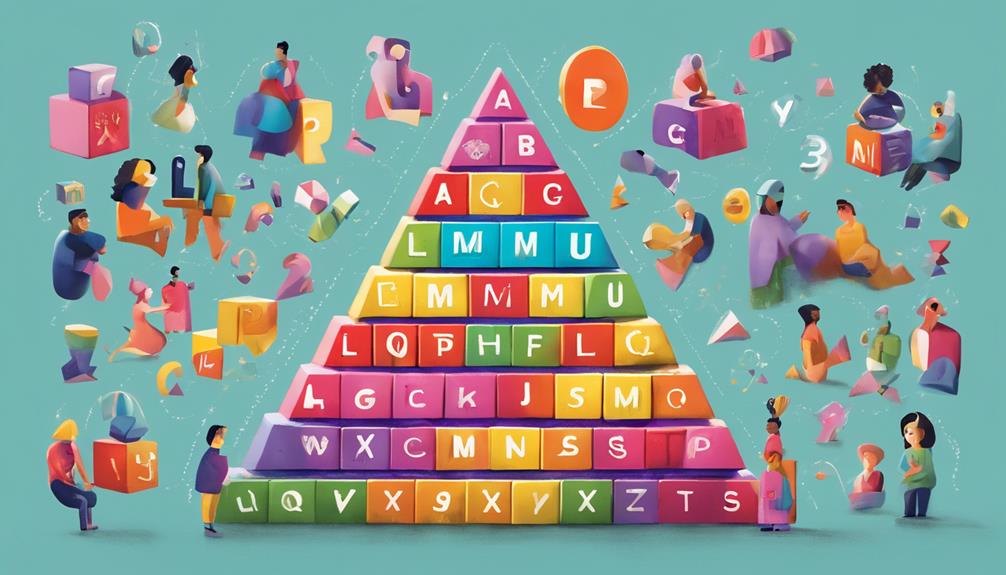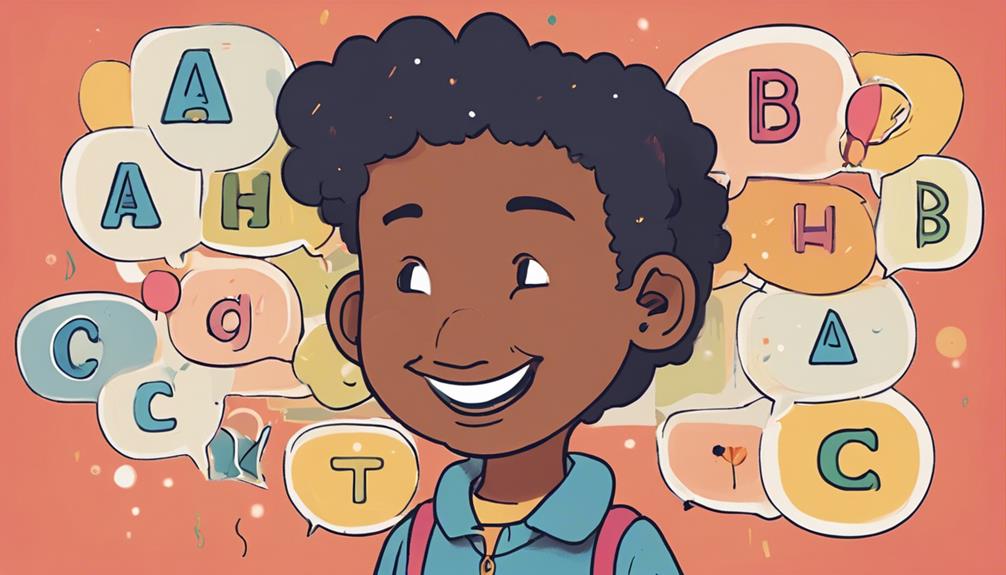In today's interconnected world, proficiency in English has become a vital skill for effective communication. For beginners, taking the first step towards mastering the language can be a challenging task. English Speaking Class 1 for Beginners provides an exhaustive introduction to the language, covering essential components such as the alphabet, grammar, and vocabulary. As students progress through the course, they will develop a solid foundation in English, but the question remains: what are the key elements that make this course truly effective in helping students achieve fluency?
Building Blocks of English

While learning a new language can seem like an insurmountable task, understanding the fundamental components of English is essential for establishing a strong foundation.
The building blocks of English include the alphabet, grammar, and vocabulary. Mastering these elements is essential for effective communication in English.
The 26 letters of the alphabet form the basis of written English, and understanding their sounds and combinations is pivotal for reading and writing skills.
Grammar provides the rules and structure for constructing sentences and conveying meaning. It encompasses various aspects, including verb tenses, subject-verb agreement, and sentence structure.
Vocabulary, on the other hand, refers to the words and phrases used to convey meaning. Building a strong vocabulary is essential for expressing oneself effectively and accurately.
Understanding the nuances of word meanings, connotations, and context is imperative for effective communication. By focusing on these fundamental components, learners can establish a solid foundation in English and improve their overall language proficiency.
Mastering Basic Phrases
Mastering Basic Phrases
Basic phrases are the cornerstone of effective communication in English, providing a solid foundation for learners to build upon.
Mastering these phrases enables individuals to convey their thoughts, needs, and wants in a clear and concise manner. It is essential for beginners to focus on learning basic phrases that can be used in everyday situations, such as greetings, introductions, and farewells.
Some essential phrases to start with include "Hello, how are you?" "What's your name?" "Where are you from?" and "Nice to meet you."
These phrases can be used in various social situations, allowing learners to interact with native speakers confidently.
Additionally, phrases like "I'd like…" "Can I have…" and "How much is this?" can be used in shops, restaurants, and other public places.
Understanding English Pronunciation

As learners become more confident in their ability to communicate using basic phrases, they must also focus on correct pronunciation to guarantee their messages are conveyed accurately.
Pronunciation is a vital aspect of effective communication, as mispronunciation can lead to misunderstandings and misinterpretations. In English, the same word can have different meanings based on the stress, intonation, and rhythm used when pronouncing it.
To improve pronunciation, learners should start by familiarizing themselves with the International Phonetic Alphabet (IPA), which provides a standardized representation of sounds in written form.
This will help them identify and practice the correct sounds and intonation patterns of English words. Listening to native speakers and mimicking their pronunciation is also essential.
Learners can practice pronunciation through audio and video recordings, as well as speaking with native speakers or language exchange partners. By focusing on correct pronunciation, learners can verify that their messages are conveyed accurately and effectively, ultimately enhancing their overall communication skills.
Essential Vocabulary for Beginners
Building a strong vocabulary is a crucial step in learning English, and for beginners, mastering the basics is key.
To focus on the most commonly used words and phrases, this foundation will enable learners to express themselves effectively and understand others.
Essential vocabulary for beginners includes basic phrases for greetings, introductions, and farewells, such as "hello," "goodbye," and "how are you?"
Learners should also focus on common verbs like "to be," "to have," and "to do," as well as basic adjectives like "big," "small," and "happy."
Additionally, beginners should learn vocabulary related to food, family, and daily routines, such as "breakfast," "lunch," "dinner," "mother," "father," and "brother."
Understanding these fundamental words and phrases will provide a solid base for further language development.
Everyday Conversation Scenarios

In the domain of everyday interactions, conversation scenarios play a vital role in facilitating effective communication.
These scenarios encompass various situations that individuals encounter daily, such as greetings, introductions, and basic interactions. Mastering these scenarios is essential for beginners to build confidence in their English speaking abilities.
Everyday conversation scenarios include ordering food at a restaurant, making a reservation at a hotel, or engaging in small talk with colleagues.
These scenarios require learners to use context-specific vocabulary, grammar, and pronunciation to convey their message effectively. For instance, when ordering food, learners need to use vocabulary related to food, quantities, and preferences. They must also be able to ask for clarification, make requests, and respond to questions from the server.
Putting It All Into Practice
Practicing everyday conversation scenarios in a real-world setting is essential to reinforce language skills and build fluency.
This is where learners can apply the language structures, vocabulary, and grammar rules learned in class to authentic situations. By doing so, they can develop their ability to think on their feet, respond naturally, and convey their intended message effectively.
To put it all into practice, learners can engage in role-plays, group discussions, or conversations with native speakers.
They can also participate in language exchange programs, where they can interact with fellow learners or native speakers. Additionally, learners can practice their speaking skills in everyday situations, such as ordering food at a restaurant, asking for directions, or making a reservation at a hotel.
The key is to immerse themselves in the language and make it a part of their daily routine.
Frequently Asked Questions
Can I Learn English if I'm a Slow Learner?
Regardless of individual learning pace, acquiring a new language is feasible with dedication and the right approach. Focusing on understanding, practice, and patience can help slow learners overcome challenges and make steady progress in language acquisition.
How Long Will It Take to Become Fluent in English?
Achieving fluency in English depends on various factors, including individual learning pace, dedication, and consistent effort. With regular practice and exposure, fluency can be attained in 1-5 years, but crucial to set realistic goals and celebrate progress along the way.
Do I Need to Learn American or British English First?
When deciding which English variant to learn first, consider your goals and target audience. If you'll be interacting with Americans, focus on American English; if you'll be communicating with Brits, prioritize British English.
Are There Any Free Online English Speaking Resources?
When seeking to improve English speaking skills, numerous free online resources are available. Websites like Duolingo, Coursera, and edX offer interactive lessons and exercises, while YouTube channels like EnglishClass101 and LearnEnglish with Emma provide engaging video content for language learners.
Can I Improve My English Speaking Skills Without a Tutor?
Yes, it is possible to improve English speaking skills without a tutor. Utilize online resources, language exchange apps, and self-study materials to practice speaking, listening, and pronunciation, fostering autonomous language development and self-correction.
Conclusion
In summary, English Speaking Class 1 for Beginners provides a thorough foundation in the language, covering the alphabet, grammar, and vocabulary. Students acquire basic phrases, master correct pronunciation, and learn essential vocabulary for everyday situations. Through role-plays, group discussions, and conversations with native speakers, language skills are developed and fluency is built. This course equips beginners with the necessary tools to navigate everyday conversation scenarios with confidence.




0 Comments